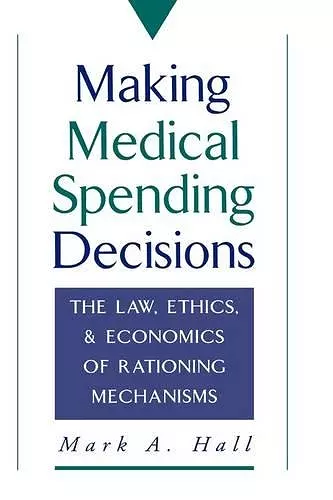Making Medical Spending Decisions
The Law, Ethics, and Economics of Rationing Mechanisms
Format:Hardback
Publisher:Oxford University Press Inc
Published:1st May '97
Currently unavailable, and unfortunately no date known when it will be back

One of the most fundamental issues in health care delivery is who should decide which items of medical care are not worth their cost. This book is a fresh and comprehensive exploration of how health care rationing decisions are made. Unlike prior works, its focus is not on the specific criteria for rationing, like age or quality of life. Instead, the author provides comparative analysis of alternative social mechanisms for making medical spending decisions: (1) consumers paying for their medical treatment out of pocket; (2) payers, government officials, or other centralized authorities setting limits on what doctors can do and what insurance will pay for; and (3) physicians motivated to make these decisions at the bedside level. His analysis of each of these mechanisms reveals that none is uniformly superior, and each is better suited for certain decisions that others. Therefore, a mix of all three is inevitable. The author develops his analysis along three dimensions: political economics, ethics, and law. The political economic dimension discusses the practical and theoretical aspects of each method for making spending decisions, synthesizing empirical studies of the situations in which each mechanism has been tested. The ethical dimension is based on several strands of philosophical theory, principally classic liberalism, social contract theory, and communitarianism, as well as conceptual analysis of terms such as autonomy and coercion. The legal dimension addresses recent developments in legal doctrine such as informed consent, insurance coverage disputes, and the emerging direction of federal regulation. Hall concludes that physician rationing at the bedside is far more promising than medical ethicists and the medical profession have traditionally allowed. The best way to allocate authority for making medical spending decisions in both public and private systems, he believes, is the informed purchase of different types of health insurance in a managed competition framework.
"His book is a helpful assessment of the decision-makers: individual patient, physician, and third party insurer....His arguements are thorough. He does not back away from discussing some of the most hotly debated topics in medical rationing. For the reader interested in a comprehensive study of rationing from a new perspective of who decides, Mark Hall's volume is a good place to begin." --Ethics and Medicine "A fresh and comprehensive exploration of how health care rationing decisions are made."--Issues in Law and Medicine "An ideal book for readers with an interest in careful argumentation and analysis as well as an informed and incisive examination of literature from a wide range of disciplines, including ethics, political theory, economics, sociology, and law....An unqualified success..."--Medical Humanities Review "Making Medical Spending Decisions is a formidable contribution to the rationing debate. Professor Hall's conclusion that physicians inevitably must serve as both economic and treatment agents should not only refuel the controversy over the physician's role at the bedside, but also provide an important springboard for discussion of physicians as overseers or case managers."--Journal of Legal Medicine Noted in Journal of Ethics, Law and Aging "This book...is a coherent whole, not a mere collection of essays. Hall draws on a remarkable range of sources, seeming equally at home in the legal, philosophical, and policy literature that he surveys. This book is a major contribution toward solving one of the most important problems faced by our country--taming the beast of health care cost inflation...."--Journal of Health Politics, Policy and Law "...this is a compelling work. Professor Hall has opened the way for a meaningful dialogue on the uses and limitations of physician bedside rationing, ably laying the groundwork for further thought....The desire for more should be seen as a tribute to the success of this work in convincing the reader of its basic premise that physicians are not bound to ingore cost in clinical decisionmaking."--Michigan Law Review
ISBN: 9780195092196
Dimensions: 243mm x 165mm x 31mm
Weight: 680g
312 pages